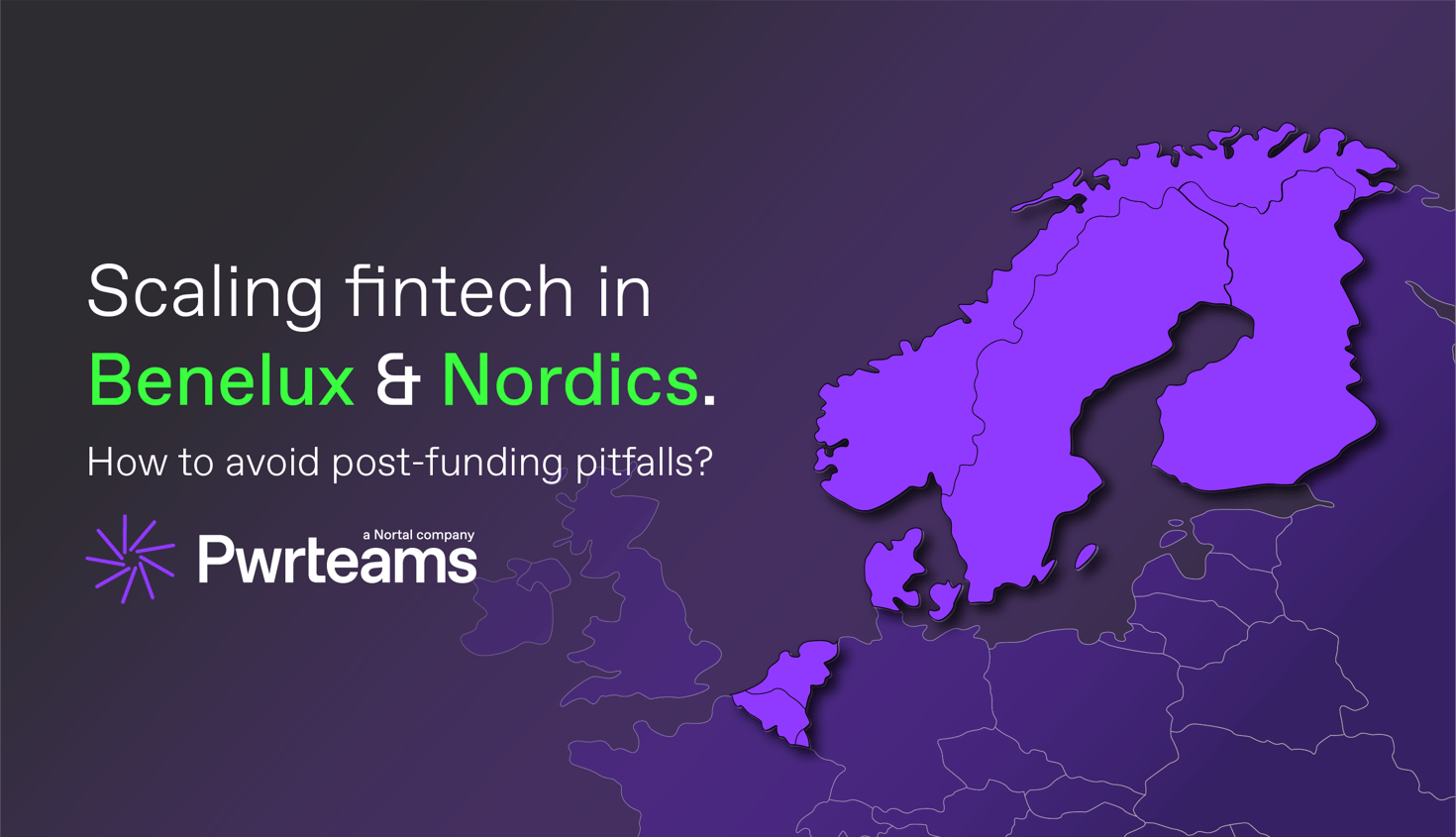Scaling fintech in Benelux & Nordics – avoiding post-funding pitfalls


Landing that funding round feels like victory – and it is. But the celebration window is brief. With approximately 75% of VC-funded companies failing and 35% not surviving past Series A, the post-funding phase demands immediate, strategic action.
At this stage, technical leadership becomes a make-or-break factor. The decisions and priorities set by founders and tech leads directly shape how effectively the development team executes. Ultimately, the difference between companies that scale successfully and those that burn through their runway often comes down to these human-capital-driven elements.
In the Benelux and Nordic markets, this pressure intensifies. These regions offer lucrative opportunities, including sophisticated financial ecosystems, high digital adoption, and clear regulatory frameworks, but they're also unforgiving. Local talent is scarce and expensive, while regulatory requirements, from PSD2 to GDPR, demand specialised expertise that most startups can't build in-house fast enough.
For fintech companies looking to establish or expand in these markets, dedicated nearshore development teams can provide the technical know-how and regulatory experience needed to move quickly. But first, you need to understand the challenges – and how to take avantage of nearshore teams to overcome fintech scaling hurdles in Benelux and the Nordics.
Why fintechs in Benelux and the Nordics hit walls after funding
First, a quick reality check.
Backed by over €162 million in funding from companies including BP Ventures, Toyota Financial Services, and Mitsubishi Corporation, the Finnish Mobility-as-a-Service app Whim seemed destined for unicorn status. Yet, recently, in what would have been the company’s first decade, it shut down. While it expanded to foreign cities like Vienna and Tokyo, alongside its native Helsinki, Whim was ultimately crushed by fierce competition, a cash-intensive business model, and heavy reliance on ecosystem partners.
Whim’s downfall made headlines, but it’s far from unique. Around 75% of venture-backed fintechs still fail, indicating that investment alone doesn’t guarantee success.
The lesson: once the funding hits your account, you’re on the clock. For founders and tech leaders alike, the pressure to deliver ROI and scale fast is relentless.
You're under pressure to deliver returns fast, but rushed execution kills more funded startups than slow progress. Success means hitting your roadmap milestones while simultaneously building product and scaling operations, a balancing act that becomes even more complex in the Benelux and Nordics, where regulatory demands and talent scarcity add to the challenges.
Founders’ hurdles in Benelux and the Nordics after closing funding rounds
New people to answer to
Sustainable scaling
Expanding your team
New responsibilities
Maturing operations
Roadmap obstacles for your scaling fintech
While the UK remains the top fintech market in Europe, the rest of the continent has been catching up in recent years. The Benelux trio and the Nordics in particular have been punching above their weight.
Their populations may be small, but they are open to innovation. Countries like Norway, Denmark, and the Netherlands all boast digital banking adoption rates of over 95%. The Nordics in particular are known for going cashless, with mobile payment usage ranging from 83% to 94%. Additionally, both regions are thriving fintech hubs. Benelux is home to over 1100 fintech companies between Belgium, the Netherlands, and Luxembourg, including Adyen, Mollie (both Dutch), Keyrock (Belgium), and Banking Circle (Luxembourg).
With over 1350 fintechs total, the Nordics are another digital banking powerhouse. Tink and Trustly are just some examples of fintechs that originate from Sweden, a regional leader. Still, other Nordic countries don’t fall far behind with companies like Vipps (Norway), Lunar and Pleo (Denmark), Zevoy (Finland), and indó (Iceland).
Successful as they are, these countries aren’t free from their challenges. What specific considerations should you take into account when expanding your fintech presence in the Nordics and Benelux?
Cost pressure from local talent
When you close a funding round, it’s tempting to dive straight into hiring and scaling. However, for fintechs in the Benelux and Nordics, relying on local tech talent can quickly deplete your cash. A significant portion of newly secured capital often goes toward scaling headcount or infrastructure. While necessary, these expenses can put significant pressure on early revenue and increase the risk of failure if growth stalls.
Bear in mind that the Nordics and the Benelux are among the most expensive places in the world for labour and operations. For example, the average software developer salary is €64,500 a year in the Netherlands and over €86,000 in Denmark. Compare that to about €43,000 in places like Poland, Bulgaria, or Romania, and you can see how much dedicated tech teams can lower your operational costs.
Want to learn how other fintechs solve that? Here’s a familiar example.
When faced with a rapid expansion, the Belgian fintech c-Quilibrium needed to bolster its development team. What first started as hiring two developers through Pwrteams soon turned into a strategic team augmentation partnership. Today, c-Quilibrium has three nearshore teams supporting their fintech development day-to-day.
Finding the right teams
Hiring developers for scaling fintech teams in the Benelux and the Nordics isn’t just costly, but also outright difficult due to a growing skill gap. At the same time, the demand for talent is growing, with 74% of SweFinTech members indicating that they plan to increase hiring in 2025.
An aging workforce, small populations, and booming demand for IT specialists have all contributed to a shortage of skilled candidates not just for fintech, but for any development-hungry industries.
For instance, the EU’s Eurobarometer survey reports that the Nordic countries are facing a shortage of approximately 300,000 cybersecurity experts, a role critical to the fintech sector. At the same time, companies across the Benelux and Scandinavian regions are aware of the need for security experts. 34% and 38% of participants from the Netherlands and Denmark, respectively, placed it very high on their priority list, according to the same survey.
~50-person R&D hub in Sofia
The UK fintech, Funding Circle, sets a great model of how using a trusted nearshore team can close the talent gap. They chose to base their new R&D division in Sofia, Bulgaria, ultimately adding nearly 50 software engineers to the team, scaling operations smoothly and affordably.
Navigating strict fintech regulations
The financial market in the regions can thrive thanks in no small part to high social trust. But that trust doesn’t come for free – to earn it, fintechs need to comply with strict regulatory requirements.
In most cases, this means adhering to European acts regulating fintechs, such as GDPR, KYC (Know Your Customer), PSD2 (Payment Services Directive), AML (Anti-Money Laundering), DORA (Digital Operational Resilience Act), MiCAR (Markets in Crypto-Assets Regulation), and CTF (Counter-Terrorist Financing).
Although these legislations are primarily concerned with consumer and data protection, there’s a general sentiment that overregulation may be hindering fintech growth. 67% of companies surveyed by SweFinTech believe that AML and CTF have a significant impact on their business; 59% say the same about GDPR.
Another concern is the limiting effect legislation has on competitiveness. “Compared to the EU, markets like the U.S. and Asia are much easier to operate in, which naturally increases investment willingness,” says Steen Lund Olsen, Chairman of Copenhagen Fintech.
Automation helps
One of our European clients, an IT service provider, needed to scale up its finance unit to keep up with the annual 30% company growth. To help our partner sustain this pace and replace manual reporting and tax-related processes, we built a custom RPA solution. In just 3 months, the tool managed to speed up task execution 5 times while eliminating human error.
Funding ups and downs
Although Sweden and the Netherlands rank among the top 5 European countries in fintech investment, funding in these two regions can be unpredictable.
In Sweden, fintech investment peaked during the pandemic and has plummeted since. In 2023, 59% of Swedish fintech companies reported difficulties in raising capital. Despite the 2020-2021 funding boom, the number of fintechs founded during this period was lower compared to earlier years.
The funding has also been dropping in Belgium, although the country has seen a 20% increase in new fintech startups. A similar trend prevails in Norway. Despite a significant rise in the number of fintechs, in 2023, the country reported a 29% decline in investment in the industry.
If there’s one country where funding remains solid, it’s the Netherlands. In the first half of 2024 alone, investments in the Dutch fintech market surged by 39% year-over-year.
In such unpredictable funding environments, even well-capitalised fintechs must plan carefully to maintain growth without overspending on scarce local talent.
Having secured early funding, Miracl, a London-based security firm, sought to maintain the pace and expand its team. For that, they needed to search for skilled developers beyond the extremely competitive London talent pool. They also turned to Sofia, tapping into nearshore IT talent that helped them scale without the high costs.
The danger of hiring too fast
New funding brings brilliant opportunities – and serious pressure. There’s no silver bullet for the ensuing challenges, but strategic team building can be the difference between sustainable scaling and hitting the wall.
When you assemble teams in a rush, you often face difficult decisions later when the project needs shift. This isn't just a minor inconvenience; it creates real business problems and teams that are misaligned, overpaid, or simply not up to scratch, stalling your business growth.
Consider what happens after launching a major feature. With traditional hiring, you've got experts on the bench who may have nothing else to do. Do you keep them on payroll? Shoehorn them into roles they weren't hired for? And the real risk only shows when your next big challenge lands. By that time, your best people may already have moved on, burnt out from sitting idle, or demotivated by poor planning.
How do you avoid these pitfalls and maximise your new funds?
In manoeuvring this challenge, flexibility is your ally. Post-funding, your focus should be on controlled, deliberate team growth, not panic hiring to plug holes. But there’s only so much your HR team can do alone, especially without access to deep, mature tech talent markets.
Because raw talent isn’t enough – you need flexibility and resilience, too. That means scaling up or down without lock-ins or hidden costs, while keeping your top performers engaged in meaningful work that builds loyalty.
Finding this balance without compromising quality might seem daunting. But it’s absolutely achievable with thoughtful team building through IT nearshoring from talent-rich countries like Poland, Ukraine, or Bulgaria.
High-quality talent
The right people help you move faster and more securely, tackle complex challenges, and build high-quality products, making every penny of your funding work harder.
Poland has over 1 million developers and top-tier tech universities, such as the Warsaw University of Technology. In Bulgaria, there are more than 500 IT professional services firms, while Ukraine boasts over 200,000 IT specialists who excel in AI and blockchain. Developers from the region consistently achieve top ranks in global skills assessments, STEM Olympiads, and other technology skill championships, demonstrating the premium quality of their work.
Scalability, speed, stability
Massive talent pools still don’t matter if you can’t access them quickly. And doing it alone puts you on the slow track.
Instead, partnering with talent experts who've built networks across Eastern European tech hubs shrinks your timeline dramatically. You'll meet hand-picked developers in weeks, not months, without wading through countless CVs and conducting endless preliminary interviews. They’ve already passed a rigorous assessment and are ready to start when you are. How’s that so?
Dedicated team providers like us have spent years building relationships you don't have time to cultivate. We know exactly who to call, tapping on connections that would take you months to build alone. And all of this with no commitment to a permanent headcount. You can scale up for big projects, scale down when they're complete. Your team size matches your exact needs and budget at any moment.
Cultural and operational fit
Cultural fit comes as standard. Without it, the impact of even the most exceptional talent will fade. After all, you’re looking to build a team. And in teams, all the cogs must be aligned.
Tech experts in the CEE region are highly proficient in English and work from compatible time zones, meaning smoother collaboration and faster results. That helps. Additionally, unlike freelancers (who can disappear) or agencies (that often swap people out), a nearshore developer team usually stays with you in the long haul. Our 95.7% retention rate is the best testament to that, and deep cultural alignment plays a key role.
Lower competition for talent
While Benelux and the Nordics face tech talent droughts, Eastern Europe offers a refreshing alternative. The region boasts a robust talent pool that grows substantially each year with thousands of fresh graduates. Good news, especially for mid-sized businesses.
Back home, you face a particular challenge, competing with deep-pocketed corporations for scarce local talent, while your needs often exceed what startups require. Poland, Ukraine and Bulgaria are your lifeboat. They offer access to versatile, cross-functional teams at significantly lower costs than in saturated Western markets, helping you build stable, loyal tech teams when local recruitment feels like a chore. For businesses feeling squeezed between global giants and nimble startups, CEE tech hubs offer precisely the breathing room they need.
Cost-effectiveness
With hourly rates varying from $25 to $65 in the three countries, IT nearshoring can cut costs significantly compared to Benelux and the Nordics. Combined with exceptional coding skills, this makes Polish, Ukrainian, and Bulgarian developers a perfect pick for mid-size fintechs.
Lower costs also allow you to hit your milestones more safely, stretch your funding further, and invest more into the growth areas that matter most.
With over 90% of global organisations predicting IT skills shortages by 2026, now is the time to act. Our CEE IT Salaries Guide 2025 gives you the data and insights to hire smarter, faster, and more affordably.
Turn funding momentum into lasting success
Funding is just the starting gun – the real race begins once the money lands. The pattern is predictable: teams either lose focus once capital arrives or fall into the overspending trap, hiring aggressively without strategic alignment, launching initiatives that don’t move the needle, and burning through runway on operational overhead rather than growth drivers.
The companies that break this cycle share common traits: scaling deliberately, managing resources strategically, and leveraging team augmentation to expand capacity without inflating budgets. In the competitive Benelux and Nordic markets, where talent is scarce and operational costs are high, this disciplined approach becomes more critical.
Our experience with fintech leaders across these regions has shown us what sustainable growth looks like. It’s about consistently hitting roadmap milestones, maintaining lean operations while scaling capabilities, and building technical teams that adapt to evolving business needs.
With IT nearshoring, we’ve helped tech leaders in Benelux and the Nordics accelerate execution, stay lean, and scale with confidence. If you’re ready to turn funding momentum into measurable progress while maintaining full control over your growth trajectory, let’s explore how nearshore teams can accelerate your fintech scaling. Let’s chat!
 September 29, 2025
September 29, 2025
Build your team or extend with ours? Here’s what helps fintech CTOs decide
Read the post September 10, 2025
September 10, 2025
Fixed-price projects vs dedicated teams: A fintech CTO comparison
Read the post September 3, 2025
September 3, 2025
How burnout is crippling tech leadership in the Nordics and Benelux
Read the post September 29, 2025
September 29, 2025
Build your team or extend with ours? Here’s what helps fintech CTOs decide
Read the post September 10, 2025
September 10, 2025
Fixed-price projects vs dedicated teams: A fintech CTO comparison
Read the post September 3, 2025
September 3, 2025
How burnout is crippling tech leadership in the Nordics and Benelux
Read the postWrite your own
success story
with Pwrteams!
Share your details in the form, tell us about your needs, and we'll get back with the next steps.
- Build a stable team with a 95.7% retention rate.
- Boost project agility and scalability with quality intact.
- Forget lock-ins, exit fees, or volume commitments.